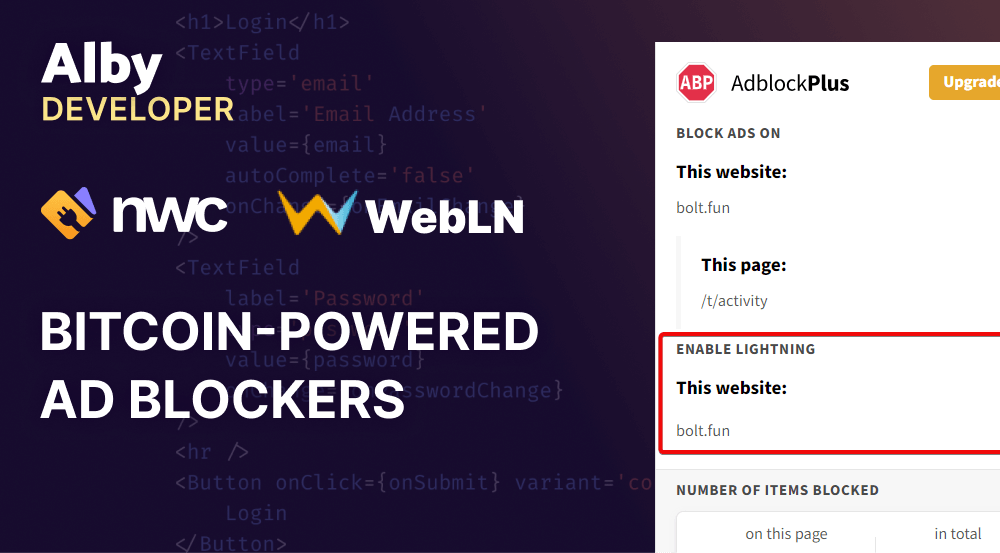Block Ads and Pay in Bitcoin today

Integrating bitcoin payments is hard easier than you think
What if we told you that every web app could accept bitcoin payments with just two lines of JavaScript? It's almost unbelievable, especially when compared to the code required by traditional payment gateways, not to mention the managerial complexities of dealing with these providers. The potential of a permissionless, open and digital native payment system like bitcoin is significant and its ease of integration into apps is surprising for many of us. But why should one pay in bitcoin and not in common fiat currency? Or are there actually enough wallets for users to pay in apps? Rightful questions that are hard to answer. But let us show you a path!
Block ads and pay in bitcoin
Ad blocking browser extensions are among the most used web extensions these days with three of them in the TOP10. Their installed base is massive. What if these extensions support bitcoin payments? No other payment network would have a bigger installed base of wallet-like apps in the browser.
That’s why we are excited to announce that ABP and uBlock support bitcoin payments, or at least these open-source forks from ABP and uBlock do.
The Adblock Plus for Chrome™ has been downloaded over 500 million times and has 45,000,000 active users. Together with uBlock Origin they have 82,000,000 active users just on Chrome. Only three browser extensions have more users today.
How do these big browser apps support bitcoin payments?
One might ask how ABP and uBlock became payment apps. The answer is: five hours of work on each of them. That’s the time it took to integrate NWC and WebLN and bring full payment functionality to the most downloaded browser extensions today.

NWC is an open protocol to connect bitcoin lightning wallets to apps. We leverage the protocol to let any NWC-enabled wallet power your own ad blocker extension with bitcoin. You can use it with Umbrel, StartOS, Mutiny, Alby, Cashu.me (in production), and a few others in the experimental stage. This means it is working across managed and self-managed wallets as well as on web, mobile and even Raspberry Pi Zero platforms. All of them are able to easily communicate with desktop, mobile, web or browser apps without the need of tor or native messaging. Once a wallet is linked, the app merely orchestrates payments between the sender and receiver but never touches funds from users. That’s a huge relief for app and wallet developers alike.
WebLN, short of the Lighting Web Standard, takes care of the communication between the extension and the website itself. It uses straight JavaScript to exchange payment requests and makes sure payments happen programmatically without scanning QR codes.
As a consequence, with NWC, every app becomes a bitcoin app and with WebLN, every bitcoin app (i.e. browsers) becomes a bridge to exchange payment requests with a website.
Business models for micropayments enhanced ad blockers
Adblockers have the potential to revolutionize the way we interact with online content by integrating payment features. How? Traditionally designed to remove unwanted advertisements from web pages, these extensions can be transformed into tools that facilitate micropayments between users and content creators. Imagine a scenario where, instead of blocking ads entirely, users can choose to support websites by making small, direct payments through their adblocker. This could be a monthly subscription for a favorite blog, a one-time payment for an in-depth article, or even a "per-view" charge for a video. This model allows users to directly reward content creators they appreciate, while still maintaining control over their browsing experience.
Adblockers can also offer a more nuanced approach to online advertising. Instead of blocking all ads, they could allow users to set a budget for viewing non-intrusive ads or no ads at all. When a user visits a website, the adblocker could automatically pay out a portion of this budget to the site, ensuring that creators are compensated for their work without bombarding users with annoying or distracting ads. This system could even allow users to customize which types of ads they see, creating a more personalized and enjoyable surfing experience on the web.
Hardly any technical barriers anymore
The integration of WebLN and NWC into ABP and uBlock exemplifies the simplicity of transforming every browser extension into a bridge for bitcoin payments. Browser extensions are just exemplary for any other app that can be powered by an external bitcoin wallet thanks to NWC. Topped off with WebLN every website operator can exchange instant and inexpensive payments with a global user base through just two lines of JavaScript: webln.enable() and webln.sendPayment(). Or would you rather rely on payout cycles of a merchant account provider or on your own code…
There is a path, but it is not straight
While these higher-level protocols and tools exist to streamline the integration of bitcoin payments, other obstacles can still make the journey to becoming a sustainably operating app challenging.
uBlock and ABP serve as evidence that there are minimal technical barriers to implementing bitcoin-based payment functionalities. Integration costs for such payments have come down significantly. Moreover, the integration costs for such payments have significantly decreased. These developments represent promising prerequisites for the expansion of an app economy powered by bitcoin’s payment infrastructure.
Please, reach out, we would love to pave the path to that vision with you. Have a look at the Alby developer dashboard where you’ll find a bunch of open source tools and APIs to create awesome payment experiences!